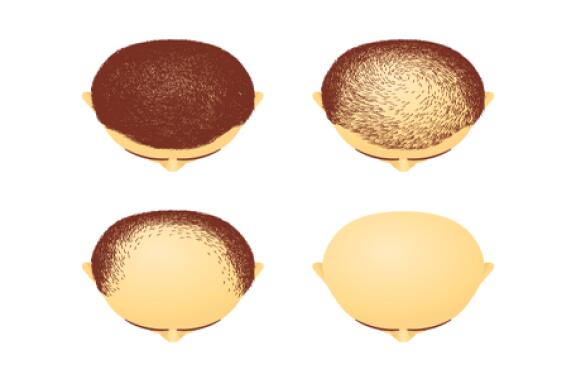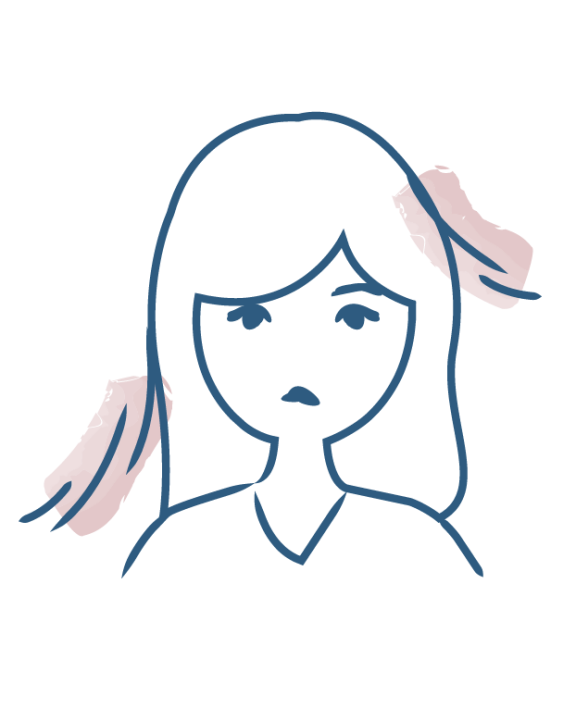What is hair loss?
Hair loss in men
- The causes of hair loss
- Hair loss: the impact of iron, zinc, vitamin D, C and B12 deficiencies
- Hair loss and genetics
- What is traction alopecia?
- Drug-induced hair loss
- Hair loss and hormones
- Hair loss and fatigue
- Hair loss and the pill
- Secondary syphilis and hair loss
- Hair loss and menopause
- Hair loss due to ringworm of the scalp
- Spot baldness and hair loss
- Hair loss due to stress: reactional hair loss
- Scarring alopecia
- Pregnancy and hair loss: everything you need to know
- Hair loss and Covid

Hair loss in men
Men are widely affected by a type of hair loss known as androgenetic alopecia. The most common form of this male alopecia is baldness, the cause of which is primarily hormonal.
What are the differences between hair loss in women and hair loss in men?
On a daily basis, hair loss affects men and women equally. The types of hair loss they experience, however, are different, as are the causes and consequences. In fact, androgenetic alopecia is more common in men (70% to 80% versus 29% to 42% for women*), whereas women are more widely affected by acute telogen effluvium and chronic telogen effluvium.
Alopecia in men is common and often appears between the ages of 30 and 40. That being said, it is not rare for this hormone-induced hair loss, which involves the androgen receptors found in the dermal papilla, to appear in younger patients.
It is interesting to note that hair loss in women is a condition that is heavily influenced by hormonal changes observed during the postpartum period and menopause. Specialists estimate that one-third, or even one-half, of women** will experience temporary hair loss following a pregnancy.
Characteristics of alopecia in young men
Androgenetic alopecia: definition
This medical and scientific term refers to diffuse hair loss that eventually leads to a reduction in hair density and whose origin is hormonal. Dihydrotestosterone (active metabolite of testosterone) stimulates the androgen receptors in the hair follicle. This results in the miniaturization of the hair follicle and the appearance of increasingly shorter, thinner hair.
Androgenetic alopecia: mechanism
Baldness, which is the most common form of androgenetic alopecia in men, is characterized by episodes of diffuse hair loss. Its onset and appearance mechanism is nearly always the same: in this case, hair loss is observed on very specific areas, on the hairline and temples, before spreading to the rest of the scalp.
Often hereditary, this hair loss affects men both young and old. Today, health professionals continue to struggle to manage this condition, and this despite there being two medicinal treatments (minoxidil and finasteride) with proven efficacy.
* Source: Blume-Peytavi et al., 2011; Norwood, 1975.
** Source: Grover and Khurana, 2013.

Our specific formulas for loss of hair density
Solutions for all types of hair density loss
- ANAPHASE NEOPTIDE Densifying Shampoo - Chronic loss of hair density &Thin-looking hair
ANAPHASE
ANAPHASE NEOPTIDE Densifying Shampoo - Chronic loss of hair density &Thin-looking hairRevitalizes - Helps to strengthen - Prevents loss of hair density - Strengthening thickening serum
ANAPHASE
Strengthening thickening serumSlows down hair loss - Boost growth - Densifies hair - Volumises - Increases hair anchorage - Increases hair thickness

What is your kind of hair density loss ?
Identify your hair density loss type via our diagnosis test and discover the care routine adapted to your hair’s needs.
More information
- Discover Chronic loss of hair density
What is hair loss?
Chronic loss of hair density
- Discover Androgenetic alopecia in women and men
What is hair loss?
Androgenetic alopecia in women and men
- Discover Everything you need to know about seasonal hair loss
What is hair loss?
Everything you need to know about seasonal hair loss
- Discover Localized hair loss
What is hair loss?
Localized hair loss
- Discover The hair's life cycle
What is hair loss?
The hair's life cycle
- Discover Diffuse hair loss
What is hair loss?
Diffuse hair loss
- Discover Hair loss in women
What is hair loss?
Hair loss in women
Our care routines
Loss of hair density, thinning hair
- Discover MY ROUTINE AGAINST CHRONIC HAIR DENSITY LOSS IN MEN (OVER 6 MONTHS)
MY ROUTINE AGAINST CHRONIC HAIR DENSITY LOSS IN MEN (OVER 6 MONTHS)
- Discover MY HAIR DENSITY LOSS ROUTINE FOR WOMEN (OVER 6 MONTHS)
MY HAIR DENSITY LOSS ROUTINE FOR WOMEN (OVER 6 MONTHS)
- Discover Anti-reactional loss of hair volume for post-pregnancy and breastfeeding women
Anti-reactional loss of hair volume for post-pregnancy and breastfeeding women
- Discover MY OCCASIONAL HAIR DENSITY LOSS ROUTINE FOR WOMEN (LESS THAN 6 MONTHS)
MY OCCASIONAL HAIR DENSITY LOSS ROUTINE FOR WOMEN (LESS THAN 6 MONTHS)
- Discover MY OCCASIONAL HAIR DENSITY LOSS ROUTINE FOR MEN (LESS THAN 6 MONTHS)
MY OCCASIONAL HAIR DENSITY LOSS ROUTINE FOR MEN (LESS THAN 6 MONTHS)
Dermatological expertise
To better understand your skin and hair, discover our exclusive content and innovative care products designed to improve your quality of life..





